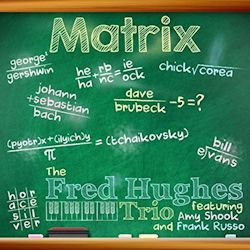 BUY NOW AmazonUK AmazonUS |
The Fred Hughes Trio Matrix
|
I Got Rhythm
Now He Sings, Now He Sobs
Room 608
B Minor Waltz
In Your Own Sweet Way
Sicily
Dolphin Dance
Two Part Invention. No. 4
Andante Cantabile
Matrix
Waltse for Dave
Watermelon Man
Samba Song
We Will Meet Again
Fred Hughes (piano): Amy Shook (bass): Frank Russo (drums)
Recorded May and August 2016
The Fred Hughes Trio doesn’t short change its fans. This is not a 35-minute six-track disc; it’s a fully-fledged bird, having reached a full incubation timing of 70-minutes. That allows the threesome, which includes bassist Amy Shook and drummer Frank Russo, to stretch out nicely over fourteen well-paced titles.
Those titles circulate around Chick Corea, clearly a formative influence on Hughes both stylistically and compositionally, as well as Herbie Hancock and a smattering of Brubeck, Horace Silver and Bill Evans. He also mines Classical tropes, as will be seen, though unusually these days he’s backward in coming forward with his own pieces: he contributes no compositions of his own to the mix, which means a focus on standards and reinventions.
He plays some nice changes on I Got Rhythm, which has neat breaks for his rhythm partners in crime, a feature of the set as a whole. Arrangements, as in Now he Sings, Now He Sobs, the first Corea piece played, are neat and tight. This is a sensitive and swinging group though opinion may well be divided when it steps out from the Corea sphere – there are five pieces by him – to embrace Tchaikovsky and Bach, an area long ago populated by Jacques Loussier. I can’t say the Bach Two-part Invention or Tchaikovsky’s Andante cantabile arrangement added much, but in defence of the latter it is rather beautifully conveyed and does serve as a kind of thoughtful interlude toward the mid-point in the programme.
Correa’s Matrix, the title of the album, sees them return to sprightlier waters contrasted with Waltse for Dave which rings the changes, tempo wise. Watermelon Man gets a reasonably funky outing and Bill Evans’ We Will Meet Again is sensitively voiced and is well chosen as an appropriate and effective envoi.
Clearly, time has been taken over the programming of this disc with waltzes, up tempo numbers, reflective ballads and classical vehicles selected to provide contrast as well as balance. On the whole this works well.
Jonathan Woolf